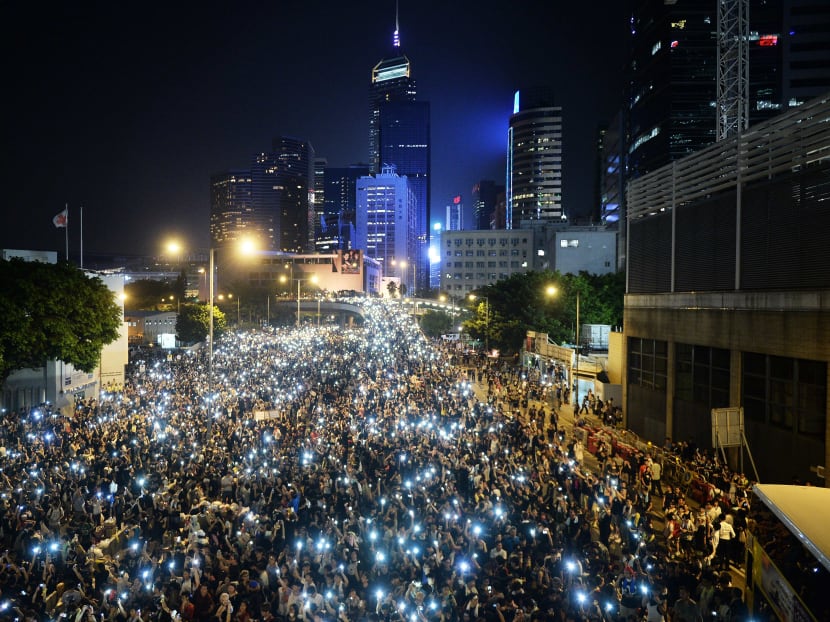Pro-democracy demonstrations escalate in Hong Kong
HONG KONG — A wave of protest in Hong Kong extended into the working week yesterday with thousands of pro-democracy activists expanding their rallies, defying a government call to abandon street blockades, while riot police withdrew from the stand-off over Beijing’s decision to limit democratic reforms in the Asian financial hub.
HONG KONG — A wave of protest in Hong Kong extended into the working week yesterday with thousands of pro-democracy activists expanding their rallies, defying a government call to abandon street blockades, while riot police withdrew from the stand-off over Beijing’s decision to limit democratic reforms in the Asian financial hub.
In Beijing, the Chinese government made clear it would not tolerate dissent and warned against any foreign interference in the semi-autonomous territory. “Hong Kong is China’s Hong Kong,” Foreign Ministry spokeswoman Hua Chunying said in a strongly worded news briefing.
The continued public resistance underscored the difficulties the Hong Kong government is facing in defusing widespread anger that erupted on Sunday, after the police used tear gas, pepper spray and batons to break up a three-day sit-in by students and other residents furious over Beijing’s decision last month to reject open nominations for candidates for Hong Kong’s 2017 leadership election.
A government announcement yesterday that the riot police had been withdrawn from the protest centres also seemed to open the door to growing demonstrations.
Hong Kong Chief Executive Leung Chun-ying urged people to go home and avoid causing trouble. “We don’t want Hong Kong to be messy,” he said in a statement broadcast early yesterday.
The number of protesters, which had ebbed overnight, swelled again by midday yesterday as office workers mixed with crowds of students in black T-shirts. Protesters also occupied streets in other parts of Hong Kong Island, including the upscale shopping area of Causeway Bay and across the harbour in Kowloon’s densely-populated Mong Kok.
The police yesterday defended the tactics they used to control the protests. “Police cordon lines were heavily charged by some violent protesters,” Mr Cheung Tak-keung, the assistant police commissioner for operations, told reporters, saying the police had to use “minimum force” in order to separate the protesters and the police.
Banks in Hong Kong, including HSBC, Citigroup, Bank of China, Standard Chartered and DBS, shut some branches and advised staff to work from home or go to secondary branches.
Hong Kong’s annual fireworks show to mark China’s National Day, which falls tomorrow, was also cancelled yesterday, in an implicit acknowledgment that officials believed protests could continue for days.
Britain said it was concerned about the situation in Hong Kong and called for the right of protest to be protected. The United States Consulate General in Hong Kong issued a statement calling for all sides to refrain from actions that would further escalate tensions.
Ms Hua said Beijing noted statements expressed by the countries such as the US. “We hope that the relevant country will be cautious on this issue and not send the wrong signal,” she said.
Chinese officials also moved quickly to control news reports of the pro-democracy demonstrations in Hong Kong. On Sunday night, officials overseeing Internet censorship blocked Instagram, presumably to ensure that images of the rallies would not spread.
The words “Occupy Central”, the name of the broad Hong Kong pro-democracy movement, and other similar terms were banned yesterday from searches on Sina Weibo, China’s biggest microblog platform. AGENCIES







